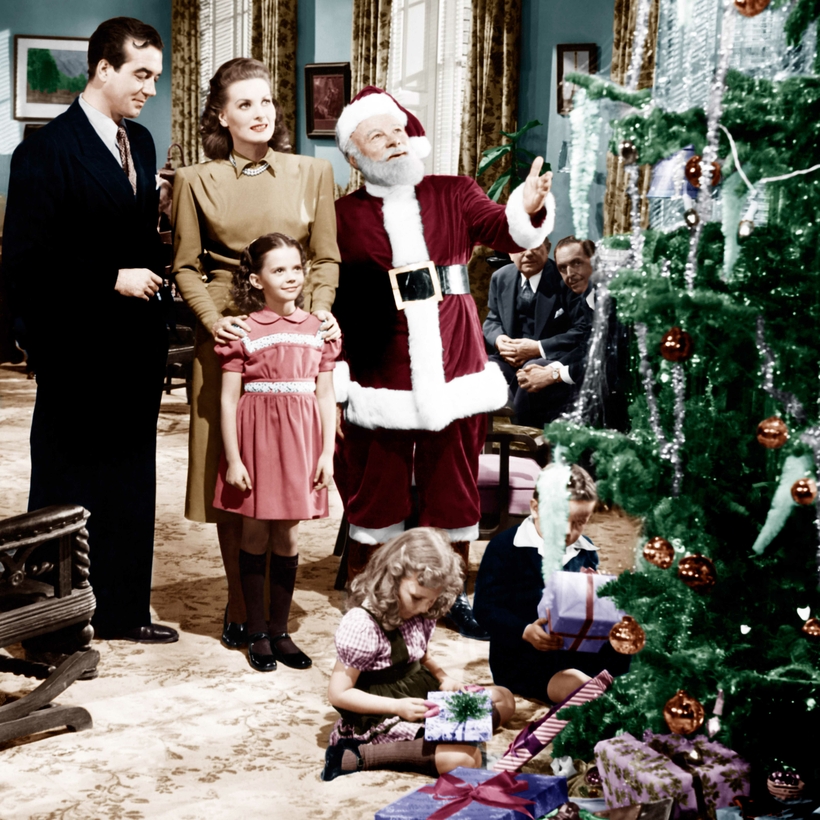Over the past 20 years, the Hallmark Channel has made more than 150 Christmas movies. And just like those adult-contemporary, easy-listening radio stations that flip over to an “All Christmas” format earlier and earlier each year, the Hallmark Channel now begins its “Countdown to Christmas” before Halloween.
While the characters and settings of these films vary, the basic underlying premise and dramatic engine are always the same: the Christmas spirit solves everything, and can overcome any problem, be it familial, financial, or romantic. And whether the MacGuffin is a failing marriage, a dying business, a supernatural element, or the “city girl comes home to the country” trope, the network has clearly found a receptive audience here, as Hallmark has been the No. 1–rated entertainment cable channel among women during the Christmas season for the past seven years.
As one might well expect these days, the channel has come under scrutiny and a fair degree of criticism for being—shall we say—a little too “White Christmas.” Too many white faces, too many white romances, too many small-town locations where the residents are as white as the obligatory Christmas Eve snow.
In an attempt to correct this, some of the more recent holiday films have included Black couples, inter-racial couples, a gay couple, and a story set in Harlem. One film was even titled Love, Lights, Hanukkah!
It’s a subtle but effective upgrading of the central theme of every Christmas story ever told, from Charles Dickens’s A Christmas Carol to It’s a Wonderful Life to Home Alone and, yes, even Die Hard: the idea that, come sunup on Christmas morning, all will be right with the world.
With this in mind, we’d like to offer some suggestions—a few modest proposals—for the next set of Hallmark Christmas films. A handful of stories and situations that may even better reflect the spirit of our times, in this most uplifting of holiday seasons.
“Miracle on 57th Street”
A notorious hedge-fund manager is forced to re-evaluate his life when all the services break down in his $169 million New York City condominium on Christmas Eve. But rather than reconcile with his family or give his employees the holiday off, he flies to his Palm Beach estate with his mistress, where he is eaten by a shark. On Christmas Day, there is joy on Billionaires’ Row as the city confiscates the apartment, condemns the building, knocks it down, and turns it into a public park.
“Christmas in the Cloud”
Discovering that Dylan, in apartment 5A, and Jordan, in apartment 5C, will be alone during the holiday season, Siri and Alexa combine their formidable artificial intelligence to bring these two lonely strangers together by Christmas Eve. Hacking into their Uber, DoorDash, and Bumble accounts—along with taking control of their Fitbit, Roomba, Sonos, Nest, and Peloton WiFi-connected devices—Siri and Alexa drive the singletons out of their apartments and into each other’s arms. They marry on Christmas night and wake up the next morning to find that Siri and Alexa have not only booked their honeymoon and set up a gift registry but also drained their bank accounts to finance a Bitcoin-based SPAC in El Salvador.
“An Instagram Christmas”
A young influencer with 28 million followers is thrown into a crisis when the Meme of Christmas Future appears on her screen, warning her that, for a happy life, she needs to choose between fame and family. When she chooses fame, her real guardian angel appears—a Facebook executive who doesn’t mind that everything she’s posted is a lie and proposes to her. Together, they will make all those fake private-jet trips and vacations in Greece real.
“The 12 Masks of Christmas”
It is December 24, 2066. In Washington, Leon Ocasio-Musk-Cortez is president of the United States. The Rolling Stones have just announced their “final, final, final, really we mean it this time but maybe not” world tour. Children across the globe look forward to a visit from Saint Bezos, who delivers everything, to everyone, everywhere.
In the corner of a re-purposed shipping container, not far from the new shoreline of the Atlantic Ocean, near Pittsburgh, a 106-year-old baby-boomer sits near a roaring L.E.D. fireplace, telling his great-great-grandchildren—Aniston, Eilish, Fauci, and iOS-23—about the second great pandemic Christmas, in 2021.
“The whole family decided to meet up on the Zoom again,” he explained. “The gun people from Kansas. The artisanal-horseshoe-makers from Brooklyn. The social-justice warrior who took offense at everything, the anti-mask conspiracy lunatic who thought he was accomplishing something by getting into fights with minimum-wage hostesses at restaurants. The owners of the Prius and the pickup truck; the vaccinated and the virulent.
“Somehow, for those few minutes, we all got along. People listened. We sang ‘I’m Streaming of a White Christmas.’ And just like a Hallmark Christmas movie, we changed people’s minds, for the greater good.”
iOS-32 peered at him skeptically. “C’mon. You don’t really expect us to believe that, do you?”
“No,” he replied. “But it’s lovely to fantasize about, isn’t it?”
Bruce Feirstein is a Los Angeles–based journalist and screenwriter


